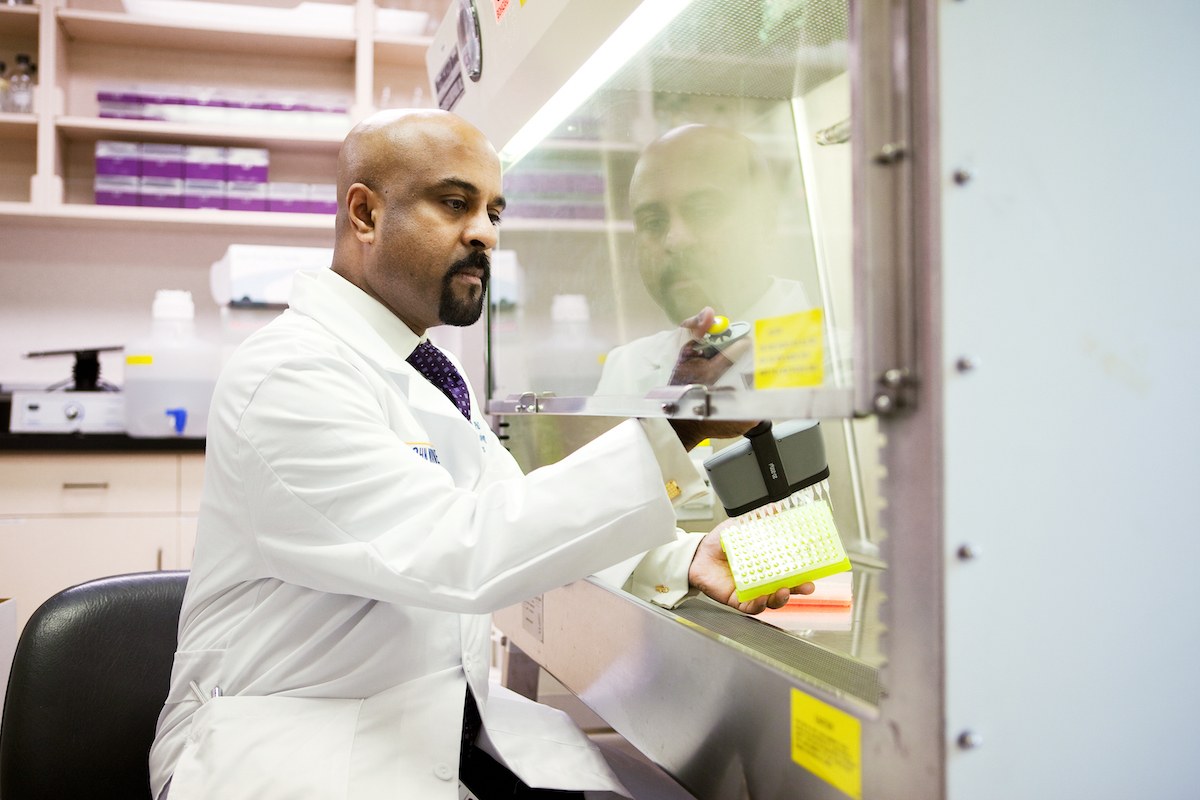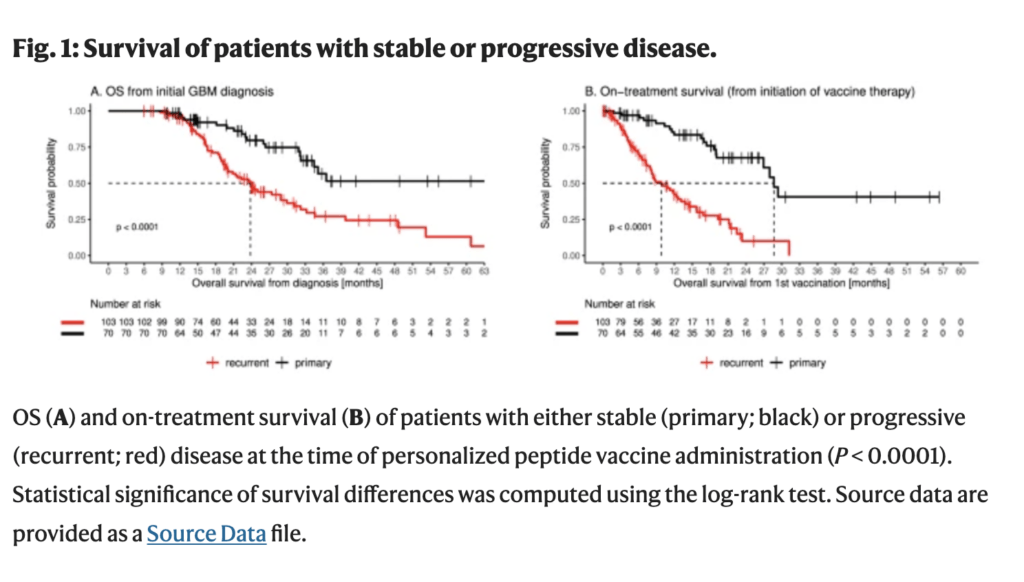

Personalized Cancer Peptide Vaccine Shows Remarkable Promise Against Glioblastoma
by Guest Author
A novel peptide vaccine against glioblastoma, a deadly brain tumor, is offering hope to some patients. Santosh Kesari, MD, PhD, is a collaborator in a study published in the August 2024 issue of Nature Communications. Learn about this new approach to treating a difficult disease.
Key Takaways
- An international team of investigators, including Providence’s Santosh Kesari, MD, PhD, has achieved a significant breakthrough in glioblastoma treatment.
- Glioblastoma is one of the deadliest types of brain cancer, with a median overall survival for GBM patients is around 15 months.
- The researchers found that a personalized peptide vaccine showed improved survival and strong immune response in glioblastoma patients.
- Findings were published in August 2024 in the high-impact journal Nature Communications.
Four years and two months ago, Mitch Friedman’s Bay Area doctors offered little hope after removing a tumor, known as glioblastoma (GBM), from his brain. But the 65-year-old retired lawyer refused to give up.
A friend introduced him to Providence researcher and neuro-oncologist Santosh Kesari, MD, PhD, head of the Pacific Neuroscience Research Center at Pacific Neuroscience Institute®. Dr. Kesari is a leading international expert in the research and treatment of GBM, one of the deadliest types of brain cancer. Even with aggressive treatment, including surgery, radiation and chemotherapy, the median overall survival for GBM patients is around 15 months. Experts and patients alike recognize the urgent need for new treatment options for this deadly disease.
Friedman is one of many of Dr. Kesari’s patients who traveled to Germany to receive a novel peptide vaccine as part of an international study. Today, he continues traditional treatment with Dr. Kesari, who believes Friedman’s survival is due to the vaccine being administered early after the cancer was diagnosed.
Personalized cancer vaccines offer new hope

In recent years, the cancer treatment landscape has begun shifting toward more personalized approaches. This is important because GBM tumors are heterogeneous i.e. no two individuals’ tumors are alike. One promising avenue is the development of personalized cancer vaccines that can target the unique mutations within each patient’s tumors. The results of the study that Friedman participated in, published in the August 2024 issue of Nature Communications, offer new hope in this direction. The study presents compelling evidence around the safety and efficacy of a personalized peptide vaccine that could extend survival for some GBM patients.
Read the peer-reviewed manuscript in Nature Communications, or read on for highlights from this research.
What are peptide vaccines?

Peptide vaccines are a novel approach in cancer treatment. Tumor cells have DNA mutations. These encode abnormal amino acid sequences known as neoantigens which become part of the tumor cells allowing them to grow and divide unchecked. Peptide vaccines are developed by identifying these specific DNA mutations within a patient’s tumor, and are designed to trigger a targeted immune response against the tumor cells. The vaccine, customized for each patient, is intended to stimulate the immune system to recognize and attack the cancer cells presenting these neoantigens, thereby killing the cancer cells and shrinking the tumor.
About the study, the largest of its kind to date
The study represents the largest real-world observation to date involving GBM patients treated with a personalized peptide vaccine. Involving 173 patients diagnosed with primary GBM, the study spanned from October 2015 to August 2023. Tumors were analyzed for DNA mutations, and the resulting data were used to create personalized vaccines targeting the identified neoantigens. The median time from tumor tissue acquisition to vaccine administration was 16 weeks, with the vaccine proving to be well-tolerated in most patients.

Promising results: safety and prolonged survival
The most encouraging finding from the study is that the vaccine-induced activation of neoantigen-specific T-cells was strongly correlated with prolonged on-treatment survival. Patients who developed multiple T-cell responses against the antigens targeted by the vaccine experienced notably longer overall survival (53 months) compared to those with lower or no induced responses (27 months; P = 0.03).

Looking to the future
For patients like Mitch Friedman, these results and his experience translates to more precious time with friends and family in the face of this devastating disease.
While more research is needed, this work adds to the growing body of evidence that personalized cancer vaccines could represent a significant breakthrough in the fight against deadly cancers like glioblastoma.
Adapted from article by Jack M. Coleman for the Providence Research Network.
Other Resources
Facing limited options and a lack of adjuvant trials, patients traveled at their own expense to receive personalized neoantigen vaccine treatment in Germany. Their dedication underscores the critical need for innovative glioblastoma therapies. The success of this vaccine not only highlights this urgent need but also aligns with the Provenance Precision Medicine Foundation’s vision of advancing precision medicine. Their mission is to make personalized treatments more accessible by bringing these transformative therapies to the U.S. They are committed to pioneering efforts that extend patient survival and improve outcomes through tailored therapies.
About Dr. Santosh Kesari

Santosh Kesari, MD, PhD, is Director of Neuro-oncology at Pacific Neuroscience Institute, Providence Saint John’s Health Center and Providence Little Company of Mary Medical Center Torrance, and leads the Pacific Neuroscience Research Center at Pacific Neuroscience Institute. He is Chair and Professor, Department of Translational Neurosciences, Saint John’s Cancer Institute and was named regional medical director of Providence Southern California’s Research Clinical Institute in April 2021. As a world-renowned neuro-oncologist and neurologist, Dr. Kesari’s focus is on the molecular and genetic cause of cancer and other severe diseases and its treatment using precision medicine techniques.
Neuro-oncology clinic locations
Pacific Neuroscience Institute
2125 Arizona Ave. Santa Monica, CA 90404
310-582-7600
Providence Saint John’s Health Cancer Center
2121 Santa Monica Blvd. “Garden Level” Santa Monica, CA 90404
310-829-8265 FAX: 310-582-7287
Providence Little Company of Mary Torrance
5215 Torrance Blvd. “3rd Floor” Torrance, CA 90503
424-212-5361 FAX: 310-316-3466
Disney Family Cancer Center
Providence Saint Joseph Medical Center
181 S. Buena Vista St. Burbank, CA 91505
818-748-4999 FAX: 310-582-7495
Providence Saint Jude Medical Center Specialty Clinic
101 E. Valencia Mesa Dr, Fullerton, CA 92835
714-446-5830 FAX: 714-992-3037
Center for Cancer Prevention Treatment
Providence Saint Joseph Hospital
1000 W. Stewart Dr. Orange, CA 92868
714-734-6294 FAX: 714-734-6231
Leonard Cancer Institute
27700 Medical Center Rd. Mission Viejo, CA 92691
949-573-9469
Related resources
Last updated: September 18th, 2024